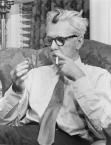
James Thurber on Wikipedia
A word to the wise is not sufficient if it doesn't make sense.
Boys are beyond the range of anybody's sure understanding, at least when they are between the ages of 18 months and 90 years.
Discussion in America means dissent.
Humor is a serious thing. I like to think of it as one of our greatest earliest natural resources, which must be preserved at all cost.
I used to wake up at 4 A.M. and start sneezing, sometimes for five hours. I tried to find out what sort of allergy I had but finally came to the conclusion that it must be an allergy to consciousness.
I'm 65 and I guess that puts me in with the geriatrics. But if there were fifteen months in every year, I'd only be 48. That's the trouble with us. We number everything. Take women, for example. I think they deserve to have more than twelve years between the ages of 28 and 40.
It is better to know some of the questions than all of the answers
Laughter need not be cut out of anything, since it improves everything.
Let us not look back in anger, nor forward in fear, but around in awareness.
James Thurber at brainyquote.com
Bibliography--Incomplete - to be updated
Is Sex Necessary? or, Why You Feel The Way You Do (spoof of sexual psychology manuals, with E. B. White), 1929, 75th anniv. edition (2004) with foreword by John Updike, ISBN 0-06-073314-4
The Owl in the Attic and Other Perplexities, 1931
The Seal in the Bedroom and Other Predicaments, 1932
My Life and Hard Times, 1933 ISBN 0-06-093308-9
The Middle-Aged Man on the Flying Trapeze, 1935
Let Your Mind Alone! and Other More Or Less Inspirational Pieces, 1937
The Last Flower, 1939, re-issued 2007 ISBN 978-1-58729-620-8
The Male Animal (stage play), 1939 (with Elliot Nugent)
Fables for Our Time and Famous Poems Illustrated, 1940 ISBN 0-06-090999-4
My World--and Welcome To It, 1942 ISBN 0-15-662344-7
Many Moons, (children) 1943
Men, Women, and Dogs, 1943
The Great Quillow, (children) 1944
The Thurber Carnival (anthology), 1945, ISBN 0-06-093287-2
The White Deer, (children) 1945
The Beast in Me and Other Animals, 1948 ISBN 0-15-610850-X
The 13 Clocks, (children) 1950
The Thurber Album, 1952
Thurber Country, 1953
Thurber's Dogs, 1955
Further Fables For Our Time, 1956
The Wonderful O, (children) 1957
Alarms and Diversions (anthology), 1957
The Years With Ross, 1959 ISBN 0-06-095971-1
A Thurber Carnival (stage play), 1960
Lanterns and Lances, 1961
Posthumous Collections:
Credos and Curios, 1962
Thurber & Company, 1966 (ed. Helen W. Thurber)
Selected Letters of James Thurber, 1981 (ed. Helen W. Thurber & Edward Weeks)
Collecting Himself: James Thurber on Writing and Writers, Humor and Himself, 1989 (ed. Michael J. Rosen)
Thurber On Crime, 1991 (ed. Robert Lopresti)
People Have More Fun Than Anybody: A Centennial Celebration of Drawings and Writings by James Thurber, 1994 (ed. Michael J. Rosen)
James Thurber: Writings and Drawings, 1996, (ed. Garrison Keillor), Library of America, ISBN 978-1-88301122-2
The Dog Department: James Thurber on Hounds, Scotties, and Talking Poodles, 2001 (ed. Michael J. Rosen)
The Thurber Letters, 2002 (ed. Harrison Kinney, with Rosemary A. Thurber)
(Wikipedia)
Time Magazine, July 9, 1951 From: "Priceless Gift of Laughter"
Slow Fade. Thurber is not totally blind. At the age of six, he lost his left eye when one of his brothers accidentally shot him with an arrow. For about the next 40 years, his right eye did double duty, then it failed him; ten years ago, Thurber underwent five extremely painful operations on it for cataract and trachoma. The eye has since had one-eighth vision, not enough for a 56-year-old writer to get himself around with safety. The shins of the long, gangling (6 ft. 1½ in., 154 Ibs.) Thurber bear a mass of scars from collisions with coffee tables.
Before his sight began to go, Thurber could punch a typewriter at a brisk pace. Never having learned the touch system, however, he is now forced to scrawl with soft pencils on sheets of bright yellow paper, getting about 20 words to a sheet, words which he cannot see, although he peers at them through a thick goggle. After he has finished the first draft of a piece, it is read back to him, and he makes oral revisions sentence by sentence. Thurber always was a relentless reviser (he rewrote The White Deer 25 times) so that his composition has become slow and painful. Nevertheless, in the past ten years he has written and published more than he did in the previous ten.
After a lapse of several years, during which he did not draw at all, Thurber is drawing again (see cover). He works with chalk on black paper, preferably just at sundown on clear days. About the porch of his Connecticut home, where he has his drawing board set up, drawings are stacked along with stove wood.
On hot days when there is a lot of glare, Thurber sometimes sees a face that looks to him like Herbert Hoover's; at other times, there appears what might be the George Washington Bridge flapping in the wind. Thurber is never bitter about his blindness, nor self-pitying, nor "saintly." Often he discusses it in a completely detached manner; now & then he uses it for little jokes. "I bet I can think up a cornier title for my memoirs than you can," he challenged a friend. "How about Long Time No See?"


No comments:
Post a Comment